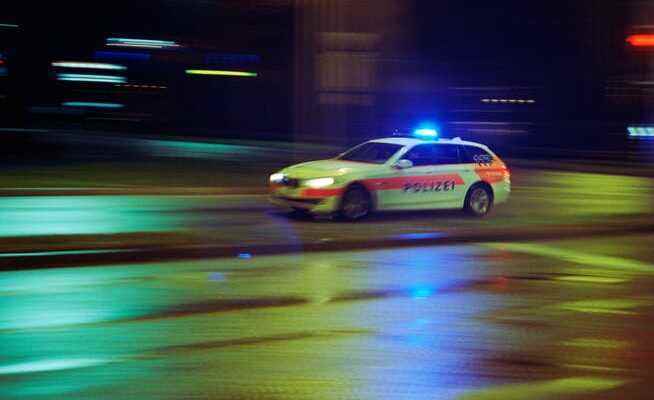After the National Council, the Council of States also wants to relax the penalties for speeding offenses. Ambulance drivers and police officers breathe a sigh of relief – but there is resistance from other quarters.
Under current law, if rescue workers step on the gas too much, they must expect a prison sentence. That should change now.
When it comes to life and death, hurry is required – but how fast can it be? From the point of view of the judiciary, a Ticino police officer overstepped the mark in June 2019: On the way to the scene of an accident, the officer was flashed at 102 km/h in town. Only 50 km/h would have been allowed. The criminal court in Lugano sentenced the law enforcement officer to a suspended prison sentence of one year. The prosecutor argued that rescue workers also had to follow the rules.
From a legal point of view, the speeding police officer was guilty of “particularly blatant disregard for the maximum speed limit” because he was traveling more than 50 km/h too fast in the 50 zone. In other words, he committed a speeding crime. In such cases, the law requires a minimum of one year imprisonment, whether it is an emergency or not.
The verdict against the Ticino police officer is not an isolated case. In recent years, several blue light drivers have been tried or convicted for driving (too) fast. The reason: the “Via Sicura” law, which was passed by Parliament in 2012.
A series of speeding accidents and illegal street races caused cross-party outrage and headlines. The so-called “Raserinitiative” demanded harsh penalties for speed offenders. However, the petition for a referendum was withdrawn because politicians also acted resolutely with “Via Sicura”: Speeding offenses were subject to a minimum prison sentence of one year and a withdrawal of ID for at least two years.
No more minimum penalty
This “punishment machine” is now over: ten years after the introduction of “Via Sicura”, the Federal Council and Parliament are going into reverse and relaxing the law. In the future, speeding offenses will no longer have a minimum prison sentence. In addition, the driver’s license should only be revoked for at least 12 months instead of 24. This is what the revision of the Road Traffic Act wants, which the Council of States unanimously approved on Tuesday.
The small chamber is following the National Council, which had already spoken out in favor of easing in March – albeit not quite as clearly. The revision had been criticized by the left as a “demonstration of power by the car lobby”.
With the changes, Parliament is addressing points of criticism that are almost as old as the law itself. Shortly after the introduction of “Via Sicura”, courts had complained that the automatism in speeding offenses allowed too little discretion. Blue light organizations also expressed concerns because ambulance drivers or police officers run the risk of being convicted of speeding. A withdrawal of ID would also be tantamount to a professional ban, it said.
“On duty with the handbrake on”
The relief is great for the blue light associations. On request, the Association of Swiss Police Officers (VSPB) writes that the adjustment is “inevitable”. The penalties threatened by the law would have affected the work of police officers: “It’s like going on duty with the handbrake on.” The Swiss Society for Emergency and Rescue Medicine (SGNOR) reports that the criminalization of driving creates an additional stress factor for rescue workers: “It feels like you have one leg in prison,” writes the association. Therefore he welcomes the revision.
Thomas Widmer, Director of the Swiss Fire Brigade Association, is also satisfied: “If you fear a threat – in addition to the threats from the operation itself – then by definition you do not act in the same way!”
Clear rules will continue to apply to firefighters and ambulance drivers in the future. If you do not exercise the necessary care on business trips or do not give off any warning signals, you are liable to prosecution. However, the penalty is to be reduced in any case. In the case of speed violations, “only the difference to the speed that would have been appropriate for the operation” is now taken into account. How exactly this adequacy is to be assessed, however, remains open.
In any case, the blue light organizations are not yet satisfied in all respects. They also demand corrections when the identity card is revoked. “It cannot be that blue light organizations and the civilian population are on the same level,” writes the police association. And the fire brigades complain that the relief should only apply to business trips, but not when driving to the headquarters. “This limits accessibility in the barracks and thus extends the deployment time.”
Roadcross Foundation considers referendum
The template is not completely dry yet. There is resistance to the relaxation of the Raser article: When asked, Willi Wismer, the President of the Foundation Board of Roadcross, confirmed that his organization was considering to hold a referendum or to launch a new popular initiative to maintain the status quo. The Roadcross Foundation, which is committed to road safety, submitted the so-called “Raserinitiative” in 2011.
Wismer understands the concerns of the rescue organizations and welcomes the adjustment in this area. But he is of the opinion that the planned change in the law sends the wrong signal to speeders: “Without the minimum penalty, the inhibition threshold to thunder down the motorway at 250 km/h falls,” he says. By relying on a few “cases far-fetched” by politicians, they now protect 99 percent of speeders. The courts already have enough leeway today: “If there is no intent when speeding, the minimum penalty is not mandatory,” says Wismer.
Ten years after the introduction of the rigorous speeding regime in Switzerland, politicians are stepping on the brakes again – but the debate could soon be relaunched.
